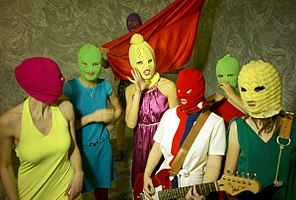Pussy Riot
| Pussy Riot | |
|---|---|

Members of the band Pussy Riot
|
|
| Background information | |
| Origin | Moscow, Russia |
| Genres | |
| Years active | 2011–present |
| Website | pussy-riot |
Pussy Riot is a Russian feminist protest punk rock group based in Moscow. Founded in August 2011, it had a variable membership of approximately 11 women ranging in age from about 20 to 33 (as of 2012[update]). The group staged unauthorised provocative guerrilla performances in unusual public places, which were made into music videos and posted on the Internet. The collective's lyrical themes included feminism, LGBT rights, and opposition to Russian President Vladimir Putin, whom the group considered to be a dictator. These themes also encompassed Putin's links to the leadership of the Russian Orthodox Church.
They gained global notoriety when five members of the group staged a performance inside Moscow's Cathedral of Christ the Savior in 2012. The group's actions were regarded sacrilegious by the Orthodox clergy and eventually stopped by church security officials. The women said their protest was directed at the Orthodox Church leaders' support for Putin during his election campaign. On March 3, 2012, two of the group members, Nadezhda Tolokonnikova and Maria Alyokhina, were arrested and charged with hooliganism. A third member, Yekaterina Samutsevich, was arrested on March 16. Denied bail, they were held in custody until their trial began in late July. On August 17, 2012, the three members were convicted of "hooliganism motivated by religious hatred", and each was sentenced to two years' imprisonment. On October 10, following an appeal, Samutsevich was freed on probation and her sentence suspended. The sentences of the other two women were upheld.
The trial and sentence attracted considerable attention and criticism, particularly in the West. The case was adopted by human-rights groups, including Amnesty International, which designated the women as prisoners of conscience, and by a number of prominent entertainers. Public opinion in Russia was generally less sympathetic towards them. Having served 21 months, Tolokonnikova and Alyokhina were released on December 23, 2013, after the State Duma approved an amnesty.
...
Wikipedia
